外研版 英语 七年级下册 Module 11Body language Unit 1 习题课件(共14张PPT)
文档属性
| 名称 | 外研版 英语 七年级下册 Module 11Body language Unit 1 习题课件(共14张PPT) |
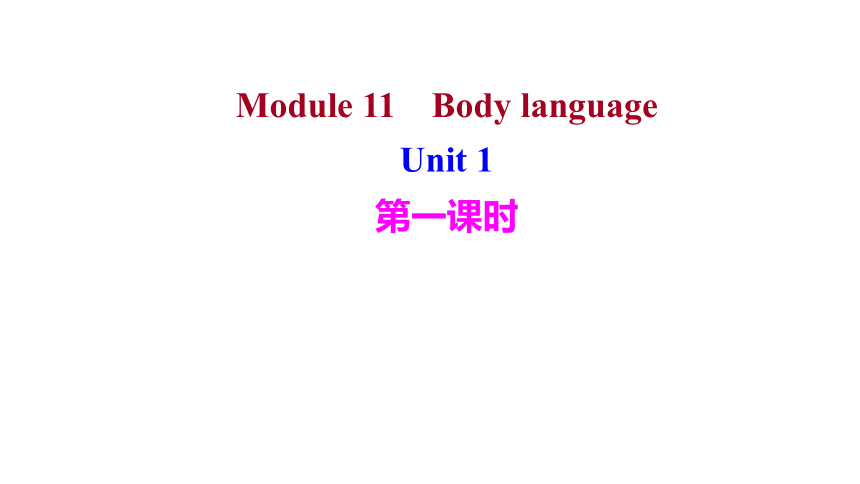
|
|
| 格式 | ppt | ||
| 文件大小 | 256.5KB | ||
| 资源类型 | 教案 | ||
| 版本资源 | 外研版 | ||
| 科目 | 英语 | ||
| 更新时间 | 2022-06-10 11:35:12 | ||
图片预览

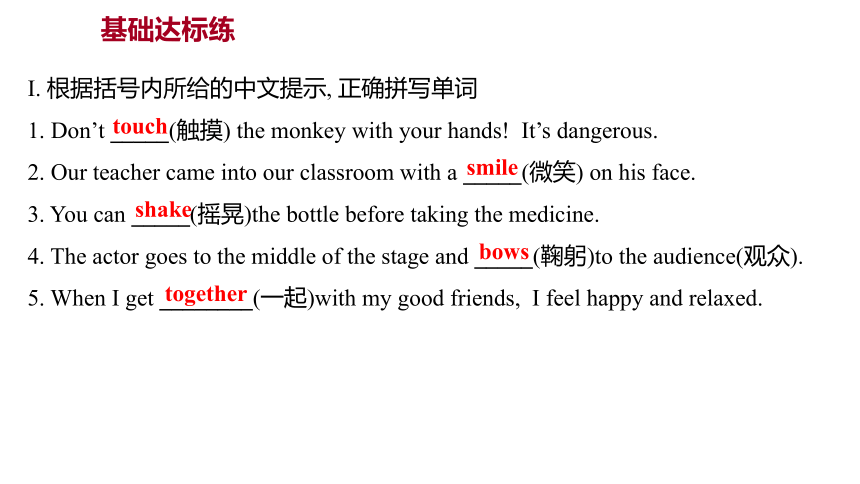
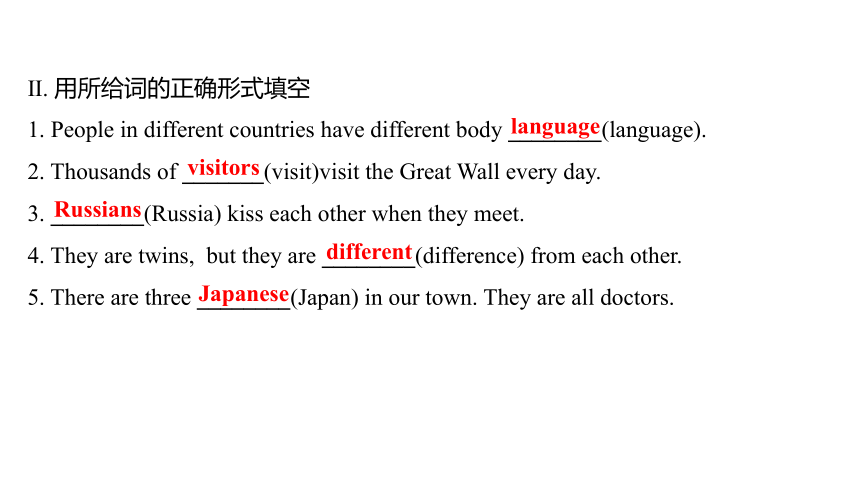
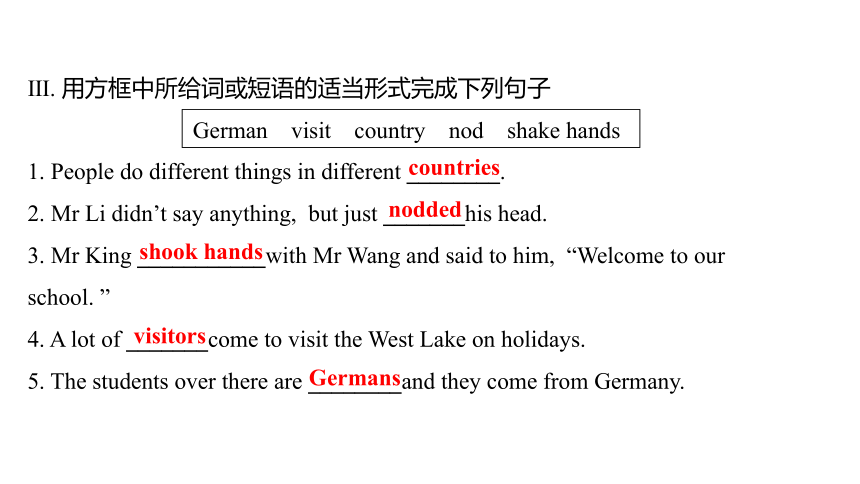
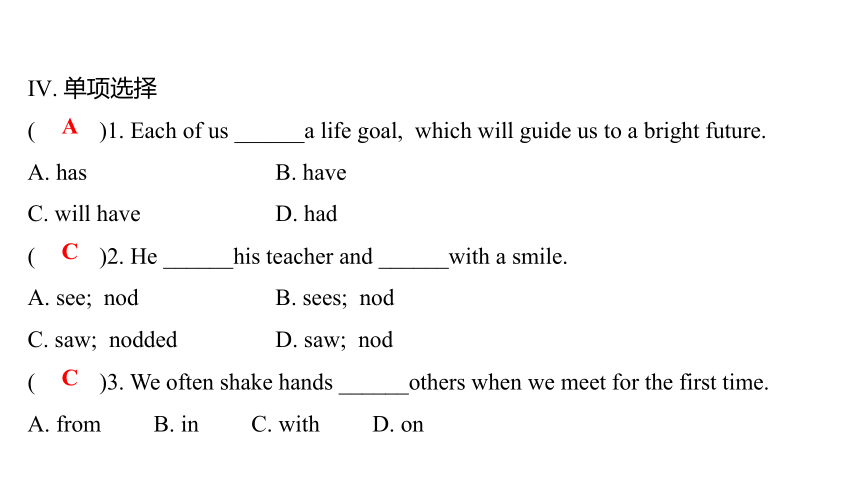
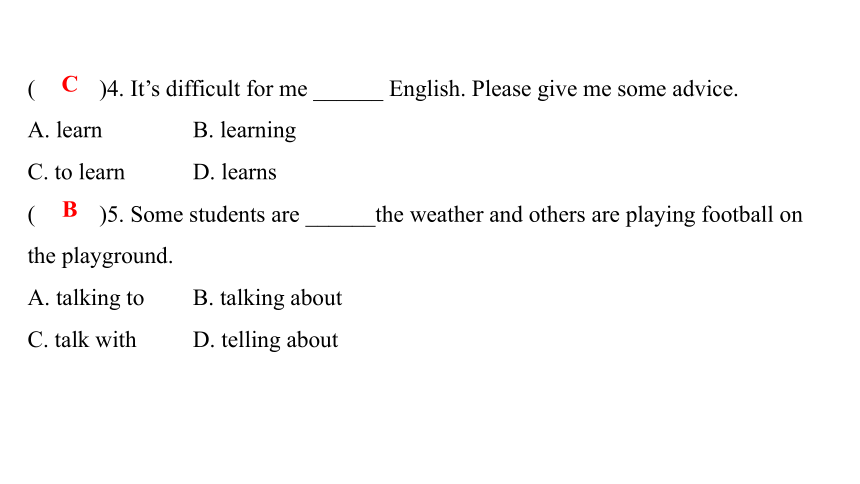
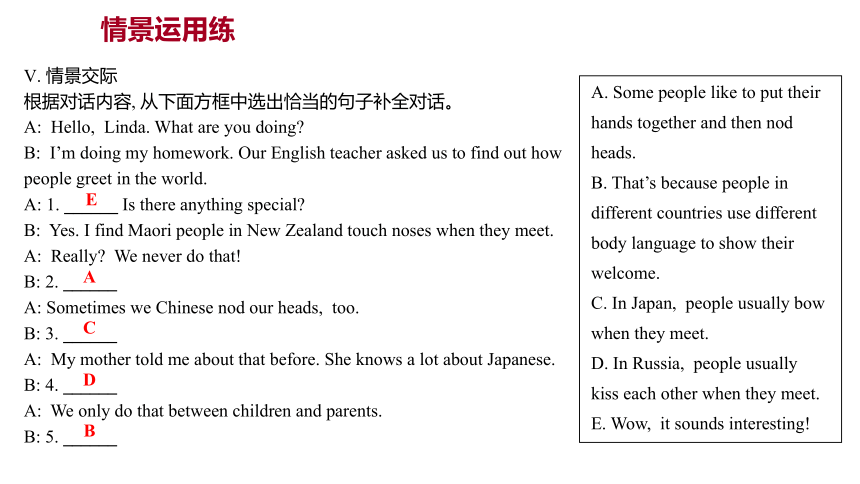
文档简介
(共14张PPT)
Module 11 Body language
Unit 1
第一课时
基础达标练
Ⅰ. 根据括号内所给的中文提示, 正确拼写单词
1. Don’t _____(触摸) the monkey with your hands! It’s dangerous.
2. Our teacher came into our classroom with a _____(微笑) on his face.
3. You can _____(摇晃)the bottle before taking the medicine.
4. The actor goes to the middle of the stage and _____(鞠躬)to the audience(观众).
5. When I get ________(一起)with my good friends, I feel happy and relaxed.
touch
smile
shake
bows
together
Ⅱ. 用所给词的正确形式填空
1. People in different countries have different body ________(language).
2. Thousands of _______(visit)visit the Great Wall every day.
3. ________(Russia) kiss each other when they meet.
4. They are twins, but they are ________(difference) from each other.
5. There are three ________(Japan) in our town. They are all doctors.
language
visitors
Russians
different
Japanese
Ⅲ. 用方框中所给词或短语的适当形式完成下列句子
German visit country nod shake hands
1. People do different things in different ________.
2. Mr Li didn’t say anything, but just _______his head.
3. Mr King ___________with Mr Wang and said to him, “Welcome to our
school. ”
4. A lot of _______come to visit the West Lake on holidays.
5. The students over there are ________and they come from Germany.
countries
nodded
shook hands
visitors
Germans
Ⅳ. 单项选择
( )1. Each of us ______a life goal, which will guide us to a bright future.
A. has B. have
C. will have D. had
( )2. He ______his teacher and ______with a smile.
A. see; nod B. sees; nod
C. saw; nodded D. saw; nod
( )3. We often shake hands ______others when we meet for the first time.
A. from B. in C. with D. on
A
C
C
( )4. It’s difficult for me ______ English. Please give me some advice.
A. learn B. learning
C. to learn D. learns
( )5. Some students are ______the weather and others are playing football on
the playground.
A. talking to B. talking about
C. talk with D. telling about
C
B
情景运用练
Ⅴ. 情景交际
根据对话内容, 从下面方框中选出恰当的句子补全对话。
A: Hello, Linda. What are you doing
B: I’m doing my homework. Our English teacher asked us to find out how
people greet in the world.
A: 1. ______ Is there anything special
B: Yes. I find Maori people in New Zealand touch noses when they meet.
A: Really We never do that!
B: 2. ______
A: Sometimes we Chinese nod our heads, too.
B: 3. ______
A: My mother told me about that before. She knows a lot about Japanese.
B: 4. ______
A: We only do that between children and parents.
B: 5. ______
A. Some people like to put their hands together and then nod heads.
B. That’s because people in different countries use different body language to show their welcome.
C. In Japan, people usually bow when they meet.
D. In Russia, people usually kiss each other when they meet.
E. Wow, it sounds interesting!
E
A
C
D
B
Module 11 Body language
Unit 1
第二课时
基础达标练
Ⅰ. 根据括号内所给的中文提示, 正确拼写单词
1. —I saw our first teacher Mr Zhang on TV last night.
—_____(什么)
2. Before going to bed, Mrs Black always _____(亲吻) her child.
3. My father _______(点头) and left the room without a word.
4. —Are your pen friends all ______(英国人)
—No. Some of them come from Japan.
5. There are a lot of good places to go in ______(俄罗斯).
What
kisses
nodded
British
Russia
Ⅱ. 单项选择
( )1. —What language does Jim speak
—______.
A. British B. German C. France D. India
( )2. ______ careful! ______ run so fast on the road.
A. Be; Not B. Be; Don’t C. Do; Can’t D. Do; Don’t
( )3. —Why were you late for school this morning
—That’s ______my bike was broken.
A. so B. and C. but D. because
B
B
D
( )4. —______ do the Japanese people say hello to each other ______they
meet
—They bow to each other.
A. How; how B. What; when
C. How; when D. What; how
( )5. Russian people’s body language is ______that of Japanese .
A. different from B. different in
C. the same as D. the same
C
A
综合能力练
Ⅲ. 判断正误
Can you speak English Maybe you know a lot of English words. You can read, speak and understand
English, but there is another kind of language—the language of the body. All over the world, people “talk”
with their hands, their heads and their eyes. When Japanese people meet, they bow. When Indians meet, they
put their hands together. When British and American people meet someone for the first time, they shake
hands. They do not usually shake hands with their friends. Women sometimes kiss their women friends, and
men kiss women friends on the cheek(脸颊). When a man meets a man friend, he just smiles, and says
“hello”. Men do not kiss each other, or hold hands. Even fathers and sons do not often kiss each other.
根据语篇内容, 判断下列句子正(T)误(F)。
( )1. People all over the world can talk with their heads and their eyes.
( )2. Japanese often bow when they meet.
( )3. When Indians meet, they put their hands together.
( )4. British and American people often shake hand with their friends.
( )5. Men often kiss a man friend on the cheek.
T
T
T
F
F
Ⅳ. 完形填空
Linda is a girl from Australia. She loves travelling very much. During her __1__, she learnt a very important lesson: It’s necessary (必要的) to know different traditions in different __2__.
When Linda was in France, her father didn’t let her touch the Western people’s __3__ things. If this happens, visitors will need to say sorry in a(n) __4__ way. Western people don’t want others to know too much about __5__ privacy (隐私). After Linda __6__ in Thailand, she couldn’t cross her legs. It __7__ her trouble (麻烦) because she often did this at home. People in Thailand also believe the left hand is not clean, so Linda didn’t use her left hand to eat food or __8__ others.
There is a very funny thing in India. Usually __9__ one’s head means “yes”, and shaking the head means “no”. But things are different in India.
Linda always wrote about __10__ she learnt during her trips on Twitter. Her short passages helped lots of friends.
( )1. A. festivals B. trips C. poems D. plays
( )2. A. cities B. villages C. towns D. countries
( )3. A. strange B. personal C. wonderful D. successful
( )4. A. polite B. special C. easy D. interesting
( )5. A. her B. his C. their D. its
( )6. A. got B. came C. left D. arrived
( )7. A. took B. moved C. brought D. returned
( )8. A. kiss B. shout C. notice D. touch
( )9. A. nodding B. waving C. pointing D. knocking
( )10. A. how B. where C. what D. who
B
D
B
A
C
D
C
D
A
C
Module 11 Body language
Unit 1
第一课时
基础达标练
Ⅰ. 根据括号内所给的中文提示, 正确拼写单词
1. Don’t _____(触摸) the monkey with your hands! It’s dangerous.
2. Our teacher came into our classroom with a _____(微笑) on his face.
3. You can _____(摇晃)the bottle before taking the medicine.
4. The actor goes to the middle of the stage and _____(鞠躬)to the audience(观众).
5. When I get ________(一起)with my good friends, I feel happy and relaxed.
touch
smile
shake
bows
together
Ⅱ. 用所给词的正确形式填空
1. People in different countries have different body ________(language).
2. Thousands of _______(visit)visit the Great Wall every day.
3. ________(Russia) kiss each other when they meet.
4. They are twins, but they are ________(difference) from each other.
5. There are three ________(Japan) in our town. They are all doctors.
language
visitors
Russians
different
Japanese
Ⅲ. 用方框中所给词或短语的适当形式完成下列句子
German visit country nod shake hands
1. People do different things in different ________.
2. Mr Li didn’t say anything, but just _______his head.
3. Mr King ___________with Mr Wang and said to him, “Welcome to our
school. ”
4. A lot of _______come to visit the West Lake on holidays.
5. The students over there are ________and they come from Germany.
countries
nodded
shook hands
visitors
Germans
Ⅳ. 单项选择
( )1. Each of us ______a life goal, which will guide us to a bright future.
A. has B. have
C. will have D. had
( )2. He ______his teacher and ______with a smile.
A. see; nod B. sees; nod
C. saw; nodded D. saw; nod
( )3. We often shake hands ______others when we meet for the first time.
A. from B. in C. with D. on
A
C
C
( )4. It’s difficult for me ______ English. Please give me some advice.
A. learn B. learning
C. to learn D. learns
( )5. Some students are ______the weather and others are playing football on
the playground.
A. talking to B. talking about
C. talk with D. telling about
C
B
情景运用练
Ⅴ. 情景交际
根据对话内容, 从下面方框中选出恰当的句子补全对话。
A: Hello, Linda. What are you doing
B: I’m doing my homework. Our English teacher asked us to find out how
people greet in the world.
A: 1. ______ Is there anything special
B: Yes. I find Maori people in New Zealand touch noses when they meet.
A: Really We never do that!
B: 2. ______
A: Sometimes we Chinese nod our heads, too.
B: 3. ______
A: My mother told me about that before. She knows a lot about Japanese.
B: 4. ______
A: We only do that between children and parents.
B: 5. ______
A. Some people like to put their hands together and then nod heads.
B. That’s because people in different countries use different body language to show their welcome.
C. In Japan, people usually bow when they meet.
D. In Russia, people usually kiss each other when they meet.
E. Wow, it sounds interesting!
E
A
C
D
B
Module 11 Body language
Unit 1
第二课时
基础达标练
Ⅰ. 根据括号内所给的中文提示, 正确拼写单词
1. —I saw our first teacher Mr Zhang on TV last night.
—_____(什么)
2. Before going to bed, Mrs Black always _____(亲吻) her child.
3. My father _______(点头) and left the room without a word.
4. —Are your pen friends all ______(英国人)
—No. Some of them come from Japan.
5. There are a lot of good places to go in ______(俄罗斯).
What
kisses
nodded
British
Russia
Ⅱ. 单项选择
( )1. —What language does Jim speak
—______.
A. British B. German C. France D. India
( )2. ______ careful! ______ run so fast on the road.
A. Be; Not B. Be; Don’t C. Do; Can’t D. Do; Don’t
( )3. —Why were you late for school this morning
—That’s ______my bike was broken.
A. so B. and C. but D. because
B
B
D
( )4. —______ do the Japanese people say hello to each other ______they
meet
—They bow to each other.
A. How; how B. What; when
C. How; when D. What; how
( )5. Russian people’s body language is ______that of Japanese .
A. different from B. different in
C. the same as D. the same
C
A
综合能力练
Ⅲ. 判断正误
Can you speak English Maybe you know a lot of English words. You can read, speak and understand
English, but there is another kind of language—the language of the body. All over the world, people “talk”
with their hands, their heads and their eyes. When Japanese people meet, they bow. When Indians meet, they
put their hands together. When British and American people meet someone for the first time, they shake
hands. They do not usually shake hands with their friends. Women sometimes kiss their women friends, and
men kiss women friends on the cheek(脸颊). When a man meets a man friend, he just smiles, and says
“hello”. Men do not kiss each other, or hold hands. Even fathers and sons do not often kiss each other.
根据语篇内容, 判断下列句子正(T)误(F)。
( )1. People all over the world can talk with their heads and their eyes.
( )2. Japanese often bow when they meet.
( )3. When Indians meet, they put their hands together.
( )4. British and American people often shake hand with their friends.
( )5. Men often kiss a man friend on the cheek.
T
T
T
F
F
Ⅳ. 完形填空
Linda is a girl from Australia. She loves travelling very much. During her __1__, she learnt a very important lesson: It’s necessary (必要的) to know different traditions in different __2__.
When Linda was in France, her father didn’t let her touch the Western people’s __3__ things. If this happens, visitors will need to say sorry in a(n) __4__ way. Western people don’t want others to know too much about __5__ privacy (隐私). After Linda __6__ in Thailand, she couldn’t cross her legs. It __7__ her trouble (麻烦) because she often did this at home. People in Thailand also believe the left hand is not clean, so Linda didn’t use her left hand to eat food or __8__ others.
There is a very funny thing in India. Usually __9__ one’s head means “yes”, and shaking the head means “no”. But things are different in India.
Linda always wrote about __10__ she learnt during her trips on Twitter. Her short passages helped lots of friends.
( )1. A. festivals B. trips C. poems D. plays
( )2. A. cities B. villages C. towns D. countries
( )3. A. strange B. personal C. wonderful D. successful
( )4. A. polite B. special C. easy D. interesting
( )5. A. her B. his C. their D. its
( )6. A. got B. came C. left D. arrived
( )7. A. took B. moved C. brought D. returned
( )8. A. kiss B. shout C. notice D. touch
( )9. A. nodding B. waving C. pointing D. knocking
( )10. A. how B. where C. what D. who
B
D
B
A
C
D
C
D
A
C
同课章节目录
- Module 1 Lost and found
- Unit 1 Whose bag is this?
- Unit 2 Are they yours?
- Unit 3 Language in use
- Module 2 What can you do ?
- Unit 1 I can play the piano
- Unit 2 I can run really fast
- Unit 3 Language in use
- Module 3 Making plans
- Unit 1 What are you going to do at the weekends?
- Unit 2 We're going to cheer the players.
- Unit 3 Language in use
- Module 4 Life in the future
- Unit 1 Everyone will study at home
- Unit 2 Every family will have a small plane.
- Unit 3 Language in use
- Module 5 Shopping
- Unit 1 What can I do for you?
- Unit 2 You can buy everything on the Internet
- Unit 3 Language in use
- Module 6 Around town
- Unit 1 Could you tell me how to get to the Nationa
- Unit 2 The London Eye is on your right.
- Unit 3 Language in use
- Revision module A
- Module 7 My past life
- Unit 1 I was born in a small village.
- Unit 2 I was born in Quincy.
- Unit 3 Language in use
- Module 8 Story time
- Unit 1 Once upon a time….
- Unit 2 Goldilocks hurried out of the house.
- Unit 3 Language in use
- Module 9 Life history
- Unit 1 He left school and began work at the age of
- Unit 2 He decided to be an actor.
- Unit 3 Language in use
- Module 10 A holiday journey
- Unit 1 What did you do?
- Unit 2 This morning we took a walk.
- Unit 3 Language in use
- Module 11 Body language
- Unit 1 They touch noses!
- Unit 2 Here are some ways to welcome them.
- Unit 3 Language in use
- Module 12 Western music
- Unit 1 It's so beautiful!
- Unit 2 Vienna is the centre of European classical
- Unit 3 Language in use
- Revision module B
